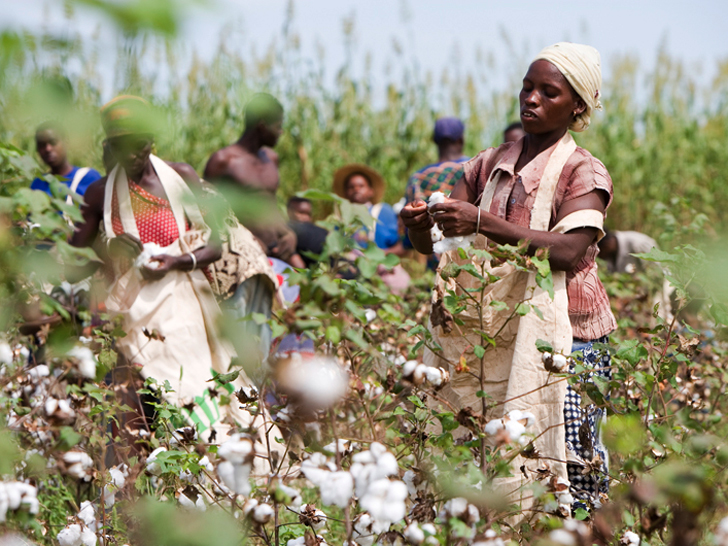Promoting Cotton By-products in Eastern and Southern Africa
Building capacity of stakeholders and policy makers to pursue opportunities in cotton value chains
Challenges
Cotton remains a strategic crop in Africa, especially for countries in Eastern and Southern Africa (ESA). It generates export revenues, as well as employment and incomes for families in rural areas. Although cotton is primarily grown for lint, other parts of the plant can be processed into by-products, adding value and creating new income opportunities for farmers, processors and entrepreneurs.
Vibrant cotton by-products industries exist in major cotton-producing counties, such as India and China. Examples include edible oil, animal feed and soap derived from ginned cottonseed; surgical dressings and currency paper derived from residue fibers; and biomass fuels, particleboard, mushrooms and fertilizer derived from cotton stalks.
Despite these opportunities, cotton by-products industries are underdeveloped in ESA owing to several impediments. These include, for example, the lack of adequate infrastructure; weak enabling policy and institutional environment; poor market information; and a lack of data to evaluate investment opportunities.
Towards a Solution
The project aimed to strengthen the capacity of stakeholders to evaluate potential investments in value-added processing of cotton by-products and of policymakers to formulate supporting, evidence-based policies.
UNCTAD used a participatory approach, providing country participants access to subject matter experts, information and analysis and leading them through a structured process to decide on priority cotton by-products for development, contained in national action plans, with accompanying policy recommendations. UNCTAD then tailored the remaining project activities, such as a study visit to India and investment profiles, to support the countries’ priorities.
Information and expert advice only go so far-seeing technologies and businesses in operation is necessary to build entrepreneurial inspiration. UNCTAD therefore organized a study visit to Nagpur, India, where several cotton by-products have reached commercial viability over the last decade. As well as its successful examples of cotton by-product industries, India provides a relevant example for African cotton-producing countries, due to similar production models, based on smallholder farms, with rainfed, hand-picked production and similar yields.
Organized by the Central Institute for Research on Cotton Technology (CIRCOT), the study visit aimed to demonstrate to African participants the technologies and business models that have thrived in India, as well as connect them with relevant machine fabricators. CIRCOT organized an excellent programme, including lectures by its scientists, site visits and a forum with approximately 50 businesses active in the sector.
One of the participants – an entrepreneur from Zambia – used the information and contacts he gathered during the study visit to India to source and order new machinery to expand the production of his absorbent cotton wool plant. After the plant upgrade, sales increased by 92 percent, to US$ 72,000 per year and he hired 11 new employees, up to 21. In addition, for the 2021-22 growing season, he has contracted 119 farmers to grow cotton to supply his plant.
Based on the success story of the Zambian entrepreneur, as well as contributing to future such investments in value-added processing of cotton by-products, the pilot project contributed to increased economic activity and job creation (SDG Targets 8.1-8.3) and more modern production equipment (SDG Target 9b).
South-South cooperation was a key element in the pilot project’s innovative approach to developing cotton by-products in African project countries. UNCTAD partnered with CIRCOT, the institution responsible for the research, development and commercialization of cotton processing technologies in India. CIRCOT experts shared their knowledge with project participants at national workshops and hosted a study visit to Nagpur, India, sharing their 30 years of experience in developing viable processing technologies and business models for cotton by-products.
The pilot project was sustainable, in that it provided a process to evaluate and invest in commercially viable cotton by-products. Project work and the resulting investments did not rely on grants or ongoing support. The approach is replicable in all cotton-producing countries seeking to add value and create new income opportunities through the development of cotton by-products. Indeed, UNCTAD formed a joint initiative on cotton by-products with the WTO and ITC to respond to new requests received from the Member States for technical assistance in this area, with several new projects underway by the close of the pilot project at the end of 2020.
Contact Information
Name: Kris Terauds Title: Economic Affairs Officer Organization: UNCTAD
Countries involved
Uganda, United Republic of Tanzania, Zambia, Zimbabwe
Implementing Entities
UNCTAD
Project Status
Completed
Project Period
2016 - 2020
URL of the practice
https://unctad.org/project/promoting-cotton-products-eastern-and-southern-africaPrimary SDG
08 - Decent Work and Economic Growth
Secondary SDGs
05 - Gender Equality, 09 - Industry, Innovation and Infrastructure, 12 - Responsible Consumption and Production
Similar Solutions










